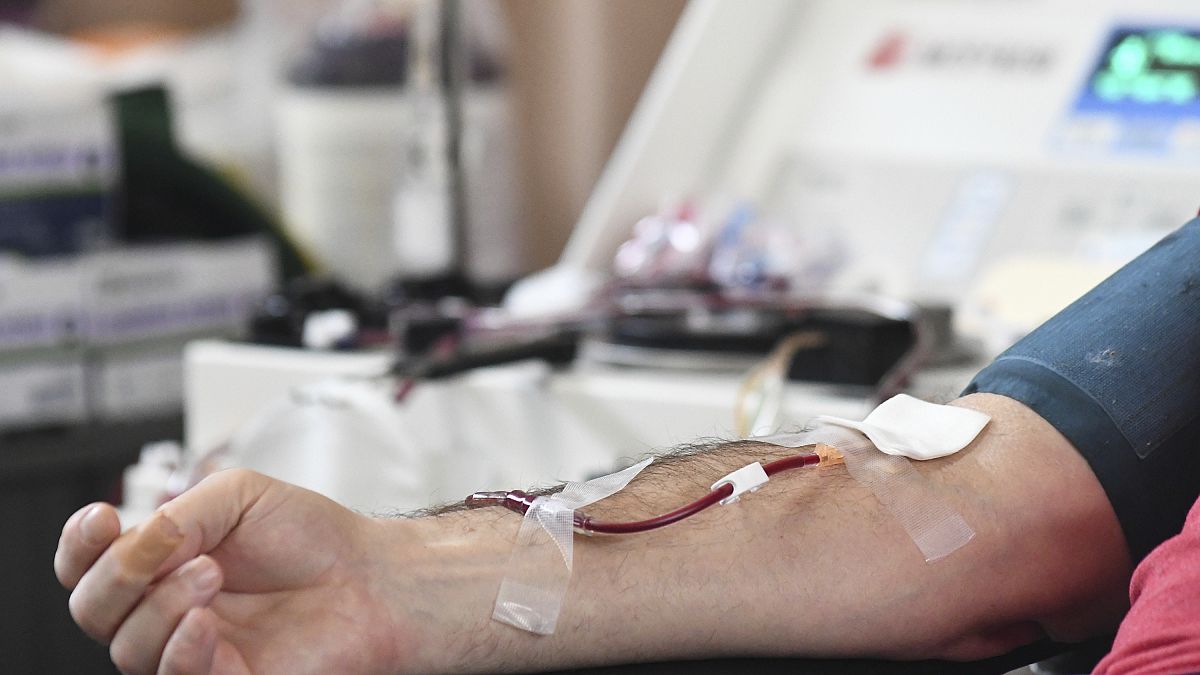On World Blood Donor Day, Euronews looks at the differences in blood donation policies across the European Union.
A growing number of EU countries have scrapped bans or deferral periods on blood donations from men who have sex with men after LGBTQI+ organisations criticised policies singling out people based on sexual orientation as discriminatory.
Restrictions on blood donations based on sexual orientation date back to the wake of the HIV/AIDS epidemic that started in the 1980s when researchers began to discover that AIDS could be transmitted by blood.
Some EU countries are now implementing deferral periods for risky sexual behaviour as part of their guidelines for blood donation instead of specific sex abstinence requirements based on the gender of a person's partner.
But other countries continue to have deferral periods or outright bans on blood donations specifically for homosexual or bisexual men.
“These measures, intended to prevent contagion, contributed to the stigma in these communities,” argued the European chapter of the International Lesbian, Gay, Bisexual, Trans and Intersex Association (ILGA-Europe) in a statement released last month.
“Today, with advancements in testing and a better understanding of blood-transmitted viruses, blood banks are now capable of ensuring safer donations," they said.
Researchers in the UK and Greece said back in 2017 that the bans on blood donations were linked to the high prevalence of HIV and AIDS in men who have sex with men but said that they were also outdated.
“The ban that forbid men who have sex with men from donating blood was implemented more than 30 years ago,” they argued in the Pan African Medical Journal.
“During the '80s, the epidemiology was different and it seems not only hypocritical but also naïve to rely on guidelines that are far outdated and old-fashioned.”
A high-profile blood contamination scandal in the 1970s and 80s, where thousands of haemophiliacs received blood contaminated with HIV, also influenced blood transfusion safety measures.
Fabrice Pilorgé, advocacy director at the French non-profit organisation AIDES who has worked on preventing HIV for 20 years, said that when it comes to blood donation policies the guidelines focus on transfusion security and work to eliminate any possible risk of contamination.
He added that there are several tools to ensure that there is no transmission of HIV, including blood tests and selecting donors based on population.
"When you are MSM (men who have sex with men), you are much more likely to encounter the virus than a heterosexual, so statistically there is also a much greater chance of being infected. Even if you protect yourself and the protection, even a condom, it's never 100%,” he said.
Blood donation policies changing in Europe
Katrin Hugendubel, ILGA-Europe’s advocacy director, said that 11 European countries have rolled back blood donation guidelines that specifically single out people based on sexual orientation recently, such as France, Lithuania and Slovenia.
“Risk behaviours should determine who is eligible to donate blood,” she said.
Homosexual men were banned from giving blood in France until 2016, when they had to abstain from sex for a year in order to do so. This period was reduced to four months in 2019 before being lifted in March 2022.
“No more questions refer to the gender of the blood donor's sexual partner,” France’s blood donation organisation told Euronews.
There is, however, still a four-month deferral period for people who are tattooed, pierced or have had more than one partner in that time period, as there is in most countries.
Pilorgé, who does not agree with how the French health ministry issued the 2022 change, said that what's most important is decreasing the residual risk of contamination.
"With the technological evolution of science, we should only decrease (risk) because today the tests are more and more reliable," he added.
He pointed out as well that there are both epidemiological and cultural differences between countries that should inform their guidelines and how they ask questions on blood donation forms.
"The (HIV epidemiological context) in France is similar to that of the United Kingdom and not similar to that of Italy, Spain or Germany," he said.
Greece also lifted a ban on homosexual and bisexual men giving blood in early 2022 as well through a ministerial decree.
That same year, Austria changed the rules on donating blood to focus on risky sexual behaviour as well, lifting bans on blood donations for trans and non-binary citizens as well.
Germany’s government, meanwhile, has pledged to end the four-month sex abstinence period ahead of blood donation for bi and homosexual men.
"Whether one can be a blood donor is a question of risk behaviour rather than sexual orientation," health minister Karl Lauterbach was quoted as saying by Deutsche Welle.
“When we look at the numbers of HIV infections in Germany, we can see that the number of men who have sex with men catching HIV has been continuously decreasing for more than a decade, whereas the number of HIV infections of men who have sex with women is growing," said Kerstin Thost, a spokesperson at the Lesbian and Gay Association in Germany.
“All people who engage in sexual activities have the opportunity to practise safer sex to reliably avoid STIs. There is no need to exclude gay, bisexual and queer men from being part of a democratic society through preventing them from donating blood,” they added.
Deferral periods and other guidelines
Several EU countries still have deferral periods for men who have had more than one male sexual partner.
In Belgium, for instance, men who have had sex with another man are prevented from giving blood for a year, with this period set to be reduced to four months in July.
A spokesperson for Luxembourg’s health ministry told Euronews that the deferral period for people with multiple sexual partners, in general, was 12 months, as they are characterised as “at risk” for sexually transmitted diseases.
Meanwhile, in Croatia, there is no legal ban on men who have sex with men giving blood but some institutions have interpreted it as forbidden "and refuse some gay men from donating blood," Iskorak, a Zagreb-based LGBT organisation, told Euronews.
Irena Jukić, director of the Croatian Institute for Transfusion Medicine, was quoted by Croatian media as saying earlier this year that the policy does not “discriminate against people based on their sexual orientation.”
“But we have to do a risk assessment and if we know that somewhere there is a slightly higher risk, we have to reduce it as much as possible.”
Meanwhile, Romania’s blood transfusion institute lists “people who have sexual relations with partners of the same sex” as presenting a risk factor for blood donation.
People in contact with HIV and other sexually transmitted diseases are listed in that same category.
Not declaring one of the risk factors constitutes a crime and is punishable, the Romanian guidelines state.
For Pilorgé, giving blood should be viewed as a service to the sick rather than an individual right.
"It’s not blood donation by MSM that is the question, it’s transfusion safety and having enough blood and plasma for our needs," he told Euronews.
Correction: An earlier version of this article stated that men who have sex with men are banned from giving blood in Croatia. While there is no legal ban, homosexual men are sometimes refused by some institutions, according to an LGBT organisation.



